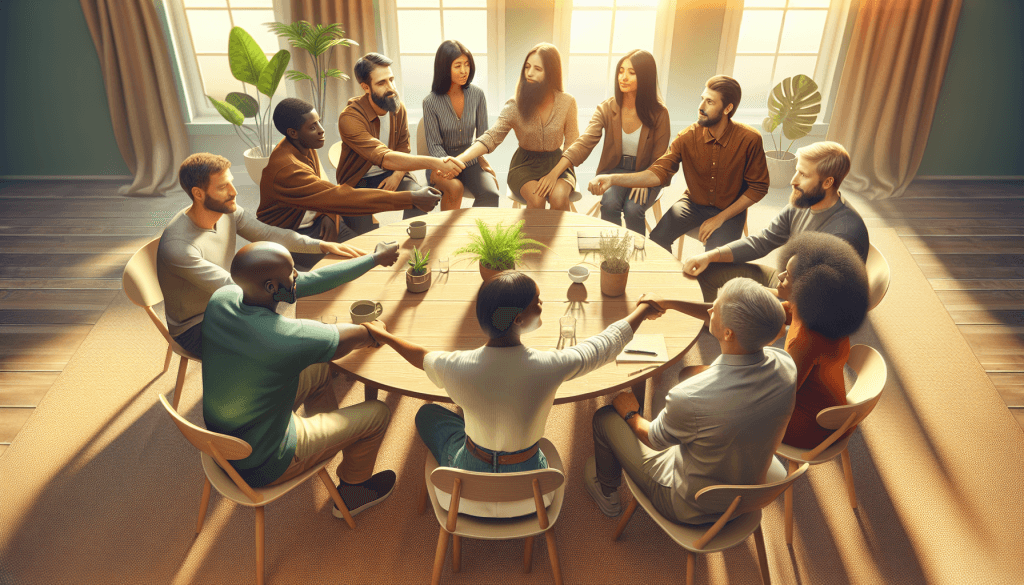Conflicts with friends can feel like a storm cloud over an otherwise sunny relationship. But the good news? You can resolve these conflicts peacefully and even strengthen your bond in the process. Learning how to handle disagreements with care is essential because friendships are some of the most valuable connections we have. Stick around, and we’ll explore practical, easy-to-follow steps to help you navigate these tricky moments with grace.
Key Takeaways
- Friendship conflicts often arise from misunderstandings, differing values, or unmet expectations.
- Addressing issues early prevents resentment and keeps trust intact.
- Effective communication, empathy, and boundary-setting are key to resolving disputes.
- Peaceful conflict resolution can deepen friendships and prevent future issues.
Understanding the Nature of Friendship Conflicts
Friendship conflicts are as natural as the changing seasons. They happen because no two people are exactly alike. But understanding why these conflicts occur is the first step toward resolving them.
Common Causes of Conflicts in Friendships
Miscommunication and Misunderstandings
Sometimes, what you say isn’t what your friend hears. Or maybe you misinterpret their actions. Miscommunication is like a game of telephone gone wrong—it can quickly spiral into hurt feelings.
Differences in Priorities or Values
Friends don’t always see eye to eye. Maybe you value quality time, but your friend prioritizes independence. These differences can create friction if not addressed.
The Importance of Addressing Conflicts Early
Preventing Resentment from Building
Letting issues fester is like ignoring a leaky faucet—it only gets worse. Addressing conflicts early stops small problems from turning into major ones.
Maintaining Trust and Respect
When you tackle issues head-on, it shows your friend that you value the relationship. This builds trust and keeps mutual respect alive.

Preparing to Resolve a Conflict
Before diving into a conversation, it’s important to prepare yourself. Think of it like stretching before a workout—it sets the stage for success.
Reflecting on the Issue
Defining the Problem on Your Own
Take a moment to figure out what’s really bothering you. Is it what your friend said, or how it made you feel? Getting clear on the issue helps you communicate better.
Identifying Your Emotions and Triggers
Are you feeling hurt, angry, or disappointed? Knowing your emotions can help you stay calm and focused during the conversation.
Setting the Stage for a Productive Conversation
Choosing the Right Time and Place
Timing is everything. Don’t bring up a sensitive topic when your friend is stressed or distracted. Find a quiet, private space where you can talk openly.
Approaching the Conversation with a Calm Mindset
Take a deep breath. Approach the discussion with kindness, not anger. A calm tone can make all the difference.

Effective Communication Strategies
Good communication is the backbone of peaceful conflict resolution. It’s not just about talking—it’s about listening, too.
Using Empathy to Understand Your Friend’s Perspective
Listening Actively Without Interrupting
Let your friend share their side of the story without jumping in. Sometimes, just feeling heard can diffuse tension.
Validating Their Feelings and Experiences
Even if you don’t agree, acknowledge their emotions. Saying, “I understand why you feel that way,” can go a long way.
Addressing the Problem Without Attacking the Person
Using “I” Statements to Express Your Feelings
Instead of saying, “You never listen to me,” try, “I feel unheard when I’m interrupted.” This shifts the focus from blame to understanding.
Avoiding Blame and Accusations
Pointing fingers only adds fuel to the fire. Stick to discussing the issue, not attacking your friend’s character.

Resolving Specific Friendship Conflicts
Every conflict is unique, but some common scenarios come up again and again. Here’s how to handle them.
When You Feel Your Friendship Isn’t Being Prioritized
Expressing Your Needs and Expectations
Let your friend know how you’re feeling. Say something like, “I miss spending time with you. Can we plan a day to hang out?”
Finding a Balance That Works for Both Parties
Compromise is key. Maybe they’re busy, but you can find small ways to stay connected.
When the Friendship Feels Competitive
Shifting the Focus from Competition to Support
Instead of competing, cheer each other on. Celebrate their wins as if they were your own.
Celebrating Each Other’s Successes
A simple “I’m so proud of you” can strengthen your bond and erase any feelings of rivalry.
When Your Friend’s Comments Feel Judgmental or Harsh
Communicating How Their Words Affect You
Say, “When you said that, it hurt my feelings.” This opens the door for an honest conversation.
Setting Boundaries for Respectful Communication
Let them know what’s okay and what’s not. Boundaries are essential for healthy friendships.
If you’re unsure how to set boundaries, check out these tips for maintaining healthy boundaries.
When You’re Caught in the Middle Between Friends
Remaining Neutral and Avoiding Taking Sides
Stay Switzerland. Encourage both friends to talk to each other instead of dragging you into the middle.
Encouraging Open Dialogue Between the Conflicting Parties
Sometimes, just facilitating a conversation can help resolve the issue.

Steps to Resolve Conflicts Peacefully
Defining the Problem Together
Sit down and agree on what the issue is. This ensures you’re both on the same page.
Setting Up a Time to Talk and Not Delaying the Conversation
Don’t procrastinate. The sooner you address the issue, the better.
Addressing the Issue Collaboratively
Work together to find a solution that works for both of you.
Seeking Outside Help If the Conflict Persists
If you’re stuck, consider talking to a counselor or mediator. Sometimes, a neutral third party can help.
For more guidance, check out these conflict resolution strategies.
The Power of Peaceful Conflict Resolution
Resolving conflicts peacefully isn’t just about fixing the problem—it’s about growing together.
Strengthening the Bond Between Friends
Overcoming challenges can bring you closer. It shows that your friendship is strong enough to weather the storm.
Building Trust and Mutual Understanding
When you handle conflicts with care, it builds trust and deepens your understanding of each other.
Creating a Win-Win Outcome for Both Parties
The best resolutions leave both people feeling heard and valued.

Preventing Future Conflicts
The best way to deal with conflicts? Avoid them in the first place.
Practicing Open and Honest Communication Regularly
Check in with your friend often. Open communication keeps small issues from turning into big ones.
Being Mindful of Each Other’s Boundaries and Needs
Respecting boundaries shows that you care about your friend’s comfort and well-being.
Cultivating Empathy and Patience in the Friendship
Friendships thrive when both people are patient and understanding.
If you want more tips on building strong friendships, read this guide on strategies for maintaining friendships.
Friendship conflicts don’t have to be the end of the road. With a little effort, you can turn them into opportunities for growth. So the next time you hit a bump in the road, remember: a peaceful resolution is always within reach.
FAQ: How to Resolve Conflicts with Friends Peacefully? Let’s Navigate Friendship Challenges Together!
Why is it important to resolve conflicts with friends peacefully?
Resolving conflicts peacefully strengthens the bond of trust and understanding in a friendship. It helps maintain a healthy relationship while fostering mutual respect and emotional growth for both parties involved.
What are the first steps to take when a conflict arises with a friend?
The first step is to stay calm and avoid reacting impulsively. Take time to reflect on the situation and approach your friend with a willingness to listen and understand their perspective without judgment.
How can I effectively communicate my feelings during a conflict?
Use ‘I’ statements to express your feelings without blaming the other person. For example, say ‘I feel hurt when…’ instead of ‘You always make me feel…’ This keeps the conversation constructive and less confrontational.
What should I do if my friend refuses to talk about the conflict?
Give them some space and time to process their emotions. Let them know you’re open to discussing the issue whenever they feel ready. Patience and understanding can go a long way in such situations.
How can I ensure I’m truly listening to my friend during a conflict resolution?
Practice active listening by maintaining eye contact, nodding, and summarizing what they say to show you understand. Avoid interrupting and focus on their words rather than formulating your response while they’re speaking.
What role does empathy play in resolving conflicts with friends?
Empathy allows you to see the situation from your friend’s perspective, helping you understand their feelings and motivations. This can lead to more compassionate and effective resolutions, strengthening your friendship in the process.
What if the conflict stems from a misunderstanding or miscommunication?
Clarify the misunderstanding by asking questions and sharing your perspective. Miscommunications often arise from assumptions, so addressing them directly can help clear the air and prevent further issues.
How can I apologize sincerely if I realize I was wrong?
Acknowledge your mistake, take responsibility, and express genuine remorse. Avoid making excuses or justifying your actions. A heartfelt apology can go a long way in mending the relationship.
What if the conflict seems unresolvable despite my efforts?
Sometimes, conflicts may require time or even external help, such as a mediator or counselor. If the friendship is important to you, don’t hesitate to seek support to find a resolution that works for both of you.
How can I prevent conflicts from happening in the future?
Maintain open and honest communication, set clear boundaries, and practice mutual respect. Regularly check in with your friend to address any concerns before they escalate into conflicts.



